Stacy Shaw

People attend supervisors' meeting on Rural Crescent Preservation.
Proposals to change Prince William County's rural land-use policies have not been well-received by residents. In a well-attended bipartisan town hall, Monday, at Stonewall Jackson High School, residents unanimously stated their appreciation of Prince William’s Rural Crescent. The Rural Crescent is an area in the county with an A1 Agricultural designation that prevents mid to high-density suburban sprawl and most commercial/retail. Most agreed it is best to keep the current land-use policy; some supported other plans that would cluster homes and put more land into conservation easements. The event, organized by Supervisors Jeanine Lawson (R-Brentsville) in cooperation with Supervisors Pete Candland (R-Gainesville) and Frank Principi (D-Woodbridge), addressed impending legislation that could open the Rural Crescent to alternate forms of development, including those with sewer access. Sewer access was a sticking point for supervisors and most residents.
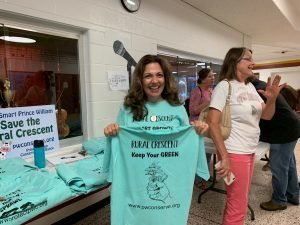
Elena Schlosberg sells tee-shirts advertising the protection of the Rural Crescent at cost.
Lawson said the Rural Crescent is a great way to manage development growth in the county, and it is also a “gem.” Opening the rural crescent would hurt everyone since it would require more infrastructure, schools and all other services, she said. “It’s not just the pleasure of diversity of land use,” she said, but also, “managing fiscal impact…when infrastructure doesn’t keep pace with the people, we sit in traffic." New schools are already overcapacity by the second or third year, said the supervisor. More development would require more services, hiring new employees. It would interrupt efforts to reduce trailers and improve older schools to provide.
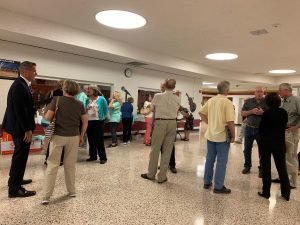
Residents gather outside the auditorium at Stonewall Jackson High School.
Staff Proposed Changes to the Rural Crescent
Since 1998, the only new residential building allowed in the Rural Crescent must be built on 10-acre lots or clustered single-family homes without sewer access. While people dislike seeing farms divided into smaller lots, most found it preferable to opening Rural Crescent to more residential development especially townhouses or apartments.
Opening the Rural Crescent to alternate land use would be beneficial to farmers hoping to sell their property at higher prices. Twenty years ago, they were told that the Rural Crescent land-use policy would likely be expired by 2018. They also liked the idea of putting 60% of their property into conservation easements.
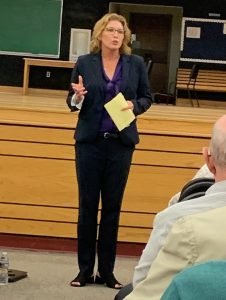
Brentsville Supervisor Jeanine Lawson talks about how expensive it would be to develop the Rural Crescent and what would be sacrificed.
In 2012, the county hired an outside consulting agency to investigate ways to configure the Rural Crescent in the future. Planning staff presented proposals to supervisors approximately every two years.
Suggestions included “clustering” homes while preserving more open space land. Staff’s most recent proposals- presented unexpected over the summer- included sewer access for clustered developments in some non-development areas.
Another recommendation was Transfer of Development rights or PDR’s Purchase of Development Rights. Some of those also depended upon bringing sewer into parts of the Rural Crescent, which residents found problematic.
The majority of speakers rejected those alternatives because they involved sewer and possibly could open the door for more residential development.
Many liked the idea of conservation easements with TDRs going towards apartments and mixed-use development in high-density areas of the county such as North Woodbridge.
Opposition to Staff Proposal
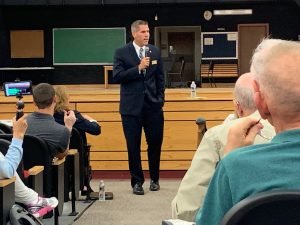
Gainesville Supervisor Pete Candland tells neighbors to stand united against proposals that come from outside consultants.
Lawson said it is an imperative sewer not enter the Rural Crescent for residential development. “Developers by nature follow the sewer lines."
Candland said they are able to disagree about the best way to protect the Rural Crescent while standing united. “No, we are not going to fight neighbor against neighbor… It’s time we stop this parade of consultants that come into our community and tell us what’s best for our community.” He said Supervisor Maureen Caddigan (R-Potomac) stands with them and perhaps supervisors could block the further investigation into this matter for a time. “For me, it is about the right kind of development in the right places,” Principi said, but Principi lost his primary election. “Make the inroads into those elected officials now while they are candidates, so you can share your opinions your thoughts about these matters. It keeps us accountable. It keeps all of us transparent. Stay active on this issue,” he said.
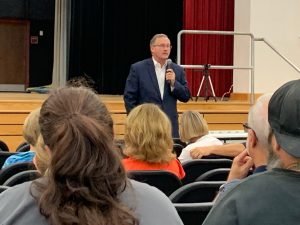
Woodbridge Supervisor Principi said that development must be done outside the rural area.
Lawson emphasized that she does not want sewer or suburban development in the Rural Crescent “To recap my comments, to me, it makes absolutely no sense that we would have to develop the Rural Crescent to preserve the Rural Crescent.” Bob Weir of Haymarket said the supervisors need to “kill it with fire; kill it tomorrow.” He argued that staff have obstructed the people’s participating in their meetings. “Staff has zero credibility with us. No one holds them accountable.” Former Delegate Bob Marshal of 13
th District (R) said staff should be following the citizen’s directive. “Stop enabling these social engineers,” and asked citizens to be vigilant and encouraged them to consider filing suit via the “false claims act.” Muneer Baig, an independent candidate running for Chairman of the Board, said there is much going on behind the political theater citizens see at the board meetings.
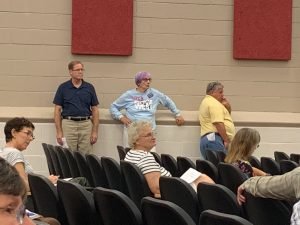
Residents wait their turn to make comments on the Rural Crescent.
Residents shared what the Rural Crescent means to them. Many moved there from more overcrowded places such as Fairfax County to enjoy nature and not have to sit in traffic. People complained of overcrowded schools and understaffed police and fire stations. Some said Ryan Homes are doing a bad just and would rather people not sell to large-scale developers. Others argued Ryan is working within the parameters of land-use. A few said it only takes a few acres to live a rural lifestyle, growing vegetables and flower, and keeping chickens and beehives. They would believe 10-acre lots do not destroy the Rural Crescent, but match the community, especially once people plant more trees. Some farm owners said it is unfair to them to be trapped under such restrictive policies for a generation and they do want to preserve open space. “Landowners - there are a lot of them in this room - we don’t want to get up and speak because there is a lot against us,” he said. “I have a lot of empathy for farmers,” said one woman, “we are being unfair.” She suggested clustering without sewers, which would benefit everyone.
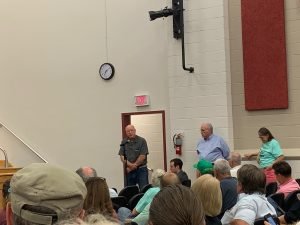
Citizen shares how he would like to the county manage its rural area.
“Maybe we need to put money into PDR rather than putting money into infrastructure.” Open space is also much better for preserving wildlife than lawns, people explained. Another woman noted that open space does not benefit people directly if it is all privately owned. The suburbs at least have playgrounds and sidewalks, but what do residents of the Rural Crescent get? Tammy Spinks of Nokesville said they need to be less concerned with landowners who have speculated on selling one day. The encroachment of the development area is decimating her home value in the Rural Crescent near the development area through, “no fault of my own.” She said this is the reason she attends so many meetings, has made her voice repeatedly heard and keeps her supervisor accountable.
 People attend supervisors' meeting on Rural Crescent Preservation.
People attend supervisors' meeting on Rural Crescent Preservation. Elena Schlosberg sells tee-shirts advertising the protection of the Rural Crescent at cost.
Elena Schlosberg sells tee-shirts advertising the protection of the Rural Crescent at cost. Residents gather outside the auditorium at Stonewall Jackson High School.
Residents gather outside the auditorium at Stonewall Jackson High School. Brentsville Supervisor Jeanine Lawson talks about how expensive it would be to develop the Rural Crescent and what would be sacrificed.
Brentsville Supervisor Jeanine Lawson talks about how expensive it would be to develop the Rural Crescent and what would be sacrificed. Gainesville Supervisor Pete Candland tells neighbors to stand united against proposals that come from outside consultants.
Gainesville Supervisor Pete Candland tells neighbors to stand united against proposals that come from outside consultants. Woodbridge Supervisor Principi said that development must be done outside the rural area.
Woodbridge Supervisor Principi said that development must be done outside the rural area. Residents wait their turn to make comments on the Rural Crescent.
Residents wait their turn to make comments on the Rural Crescent. Citizen shares how he would like to the county manage its rural area.
Citizen shares how he would like to the county manage its rural area.